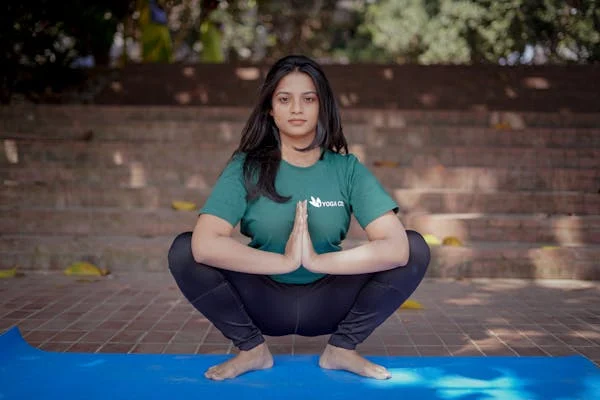
Table of Contents
Introduction
Advantage Of Meditation A haven in an otherwise noisy and chaotic world, meditation offers peace. As a yoga coach, I have clearly witnessed how meditation helps one change the inward self towards mental peace as well as overall wellness.
In this blog, we’ll understand the benefits of meditation with focus on how it leads to mental peace, while learning insights, techniques, and personal experiences guiding you on your meditation journey.
Understanding Meditation
Meditation is a mind training wherein a practitioner trains his or her mind to achieve a state of heightened awareness and clear mental vision. It has been adopted for thousands of years as a means of spiritual growth, stress relief, and self-understanding in the context of various cultures and religions.
The forms of meditation indeed differ, but the core objective remains the same: attainment of peace in one’s inner self.
The Science Behind Meditation
Advantage Of Meditation Various scientific studies have evidenced that meditation greatly affects mental health. As such, there are some studies which indicate that regular performance of meditation can be responsible for at least an important alteration in the brain structure and function, particularly upgrading regions related to emotional regulation and stress response.
MRI has also revealed that meditation increases grey matter in the hippocampus, which is known to enable the process of learning and remembering while reducing the size of the amygdala, which is one portion of the brain involved in the fight-or-flight response.


Advantages of Meditation
1.Relieves Stress and Anxiety. The most basic advantages of meditation are that it reduces stress and anxiety. Meditation is where one forgets about the aggressions of what tomorrow brings or what has already occurred and gone into this world.
Meditation fosters serenity because, during meditation, the body relaxes thoroughly, and so a level of cortisol is decreased; cortisol is the stress hormone. Equilibrium in life occurs due to the build-up skills of always giving responses to stress because more frequent practice equips the person to handle the act.
2. Enhanced Mental Clarity Mediation is the ideal activity that enhances concentration and mental acuteness.
The longer you sit in meditation, the more focused your mind becomes towards concentrating on one point-to-be-completed activity, such as focusing on your breath, a mantra, or even a little picture.
This concentrates cognitive function, thus enhancing decision-making and solving problems. Many emerge from meditation feeling that their creativity has blossomed because their minds become more open to receiving ideas.
3. Emotional Regulation Meditation is said to be practiced by enhancing emotional intelligence, thus helping the human brain regulate their emotions a little better. It works through self-awareness and enables individuals to develop a watchful view on their thoughts and emotions free of judgment.
The increased awareness leads to a better regulation of emotions and enable an individual to respond and manage obstacles much better by being equanimous and understanding.
4. Quality Sleep Life Changes A meditation practice tends to improve the quality of sleep over time. Stress and anxiety are some of the common causes of insomnia, but meditation reduces the impact of stress and anxiety on one’s mind, therefore making it easy to fall asleep and stay asleep.
Certain techniques like mindfulness meditation and guided imagery are highly recommended in preparing the mind for restful sleep.
5. Enhanced Self-Awareness Meditation can be an invitation toward reflection and introspection, so a person has the capacity to try to understand their thoughts, emotions, and actions. The increased awareness in this line provides for the growth of a human being. It enables one to make wiser decisions and align what he or she does with what is most important and what one aims for.
6. Nurturing Feelings of Compassion and Empathy Many meditation practices focus on compassion and loving-kindness, and studies like this may contribute to a greater connection to others.
The loving-kindness meditation teaches people how to extend compassion from self-preservation to their fellow human beings. Such practice leads to better relations and a stronger sense of community.
7. Healthier Immune System Meditation has been linked to enhanced physical health. Such enhancements include a stronger immune system. Scientific evidence suggests that, through meditation practice.
the immune system can function positively, thus enabling the body to respond better to dangers such as diseases. Such improvement could be due to fewer levels of stress and better emotional well-being, which also leads to better health.
8. Spiritual Development For some people, meditation may be an easy doorway to spiritual growth and light. It is how one can look inside oneself, deepen existential questions, and become a part of something much greater than oneself. It could add a deeper sense of peace and fulfillment in spirit to the concept of meditation.


Types of Meditation
There are many forms of meditation, all of which concentrate differently and use unique techniques. Here are a few popular forms:
1. Mindfulness Meditation: In this sort of meditation, one individual focuses on the present moment without judgment. They make people pay their attention either at their breath, body sensations, or the thoughts, observing them as they arise and pass on. It is considered efficient for the reduction of stress and enhancement of self-awareness.
2. Transcendental Meditation TM In TM, one silently repeats a particular mantra for attaining deep relaxation and transcendence. This is a practice that usually is learned by one having achieved a certain level of teaching from a certified teacher.
3. Loving-Kindness Meditation (Metta) This is the practice of evoking love and beneficence towards oneself and others. Practitioners chant phrases of goodwill several times, gradually widening out their circle of compassion to include friends, family, and even those they find challenging.
4. Guided Meditation: The instructor or audio recording leads the practitioner through a visualization or meditation script. Guided meditation can be particularly helpful for newcomers, as they require some assistance from the outside.
5. Zen Meditation (Zazen): This is an old form of meditation; basically, a seated meditation in which the practitioners observe their breath and note the occurrence of thoughts. It focuses more on discipline and being aware of. So, how do I start my practice?
Meditating is scary at first, but it doesn’t have to be complicated. Here’s a simple guide to see you through in one piece:
1. Schedule Your Time
Choose a time for your meditation session each day. The more you do it, the more benefits you will enjoy from it. Start with 5-10 minutes a day and increase the duration as you get accustomed.
2. Quiet Place
Sit somewhere quiet where you can sit comfortably without distractions. You could opt for a corner of your bedroom, the garden, or any other place that seems serene.
3. Choose a Comfortable Position
You can meditate sitting cross-legged on the floor, in a chair with your feet flat on the ground, or even lying down. The important thing is that the posture feels comfortable yet alert.
4. Focus on Breathing Take a few deep breaths and let your body go limp. Then, turn your attention to your breath, paying attention to the sensation of feeling air leave or enter your body. If your mind does go off somewhere, gently bring it back to focus on your breath.
5. Optional Mantra
Or you could meditate silently, using a mantra-any word or phrase that has meaning for you. Sometimes it is helpful to reduce distracting thoughts.
6. Be Patient and Gentle with Yourself
Meditation is a skill that has to be developed with time. Do not get frustrated when your mind is off or when you fail to focus. Simply acknowledge them, and gently bring your attention back to breathe or your mantra.
7. Close off with Thankfulness
Finally close off with thankfulness by thanking yourself for taking that precious time for yourself. In acknowledging your effort, positive feelings are reinforced and consistency is encouraged.


Conclusion
Other than meditation, mindfulness can be applied in your daily activities:
Mindful Eating: Savor and enjoy every bite in order to discover the different flavours and textures, the sensations that come with each.
Walking Meditation: Observe the touching of ground by your feet when you walk.
Breathing Awareness: Spend several seconds within the day to pause in concentration on your breath, especially when in an anxious or stressful state.
Beneficial Outcomes of Meditation
Indeed, the benefits of meditation are numerous and life-altering. From decreased stress to enhanced mental clarity, from emotional resilience to spiritual growth, meditation is a holistic practice that can lead to great change in one’s life.
We thus pave the road to a healthier and happier living by cultivating mental peace.
As you start your journey with meditation, which is unique only to you; thus give yourself the grace of finding, growing, and exploring what you are up to.
Be patient, dedicated, and committed, and I promise you will enjoy many benefits that come with this wonderful practice, and you will definitely be more peaceful and fulfilled about life.
